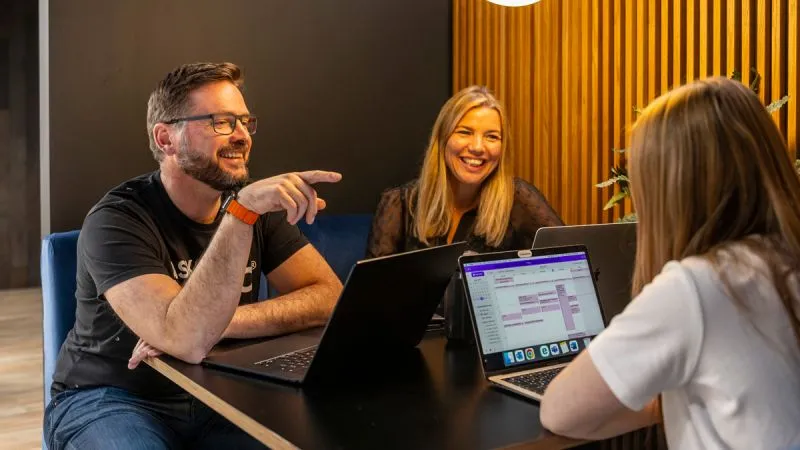
With the election looming in the UK, politicians are busy putting forward fresh ideas to woo voters. There is general cross-party support for the idea of encouraging entrepreneurship, as it helps to grow the economy. But what practical steps can be taken to do that?
Perhaps the UK can look north, for some inspiration from the Nordics. Here are five things that Nordic countries do that could be replicated in the UK.
Start entrepreneurship at school
You can start a business in the UK from age 16, but only around 1 per cent of companies are created by those aged under 20, according to a recent study by the data firm Beauhurst – the average age is 36.
Since 1980, Sweden has run a scheme called Ung Företagsamhet, which translates as Junior Achievement. Run by a non-profit education organisation of the same name and backed by public and private funds, it encourages schoolchildren to start a real-life business, known as a UF-företag. Around a third of Sweden’s upper secondary school students take part in the programme every year and in the 2023/4 school year, 38,824 students started a total of 12,396 companies, a new record, according to the organisation.
Pupils are allowed to devote a set number of hours per week to their company under the supervision of a specially qualified teacher. These so-called ‘practice companies’ don’t have the same legal status as normal ones – they can’t own assets or borrow money, for example. Pupils split any profits between them and then report this as private individuals for tax purposes.
One of Sweden’s best-known tech entrepreneurs credits the scheme with giving him the entrepreneurial bug. Konrad Bergstrom is the founder of X Shore, an electric boat maker, and chairman of Soeder, the luxury hygiene and skin care brand. When he was at high school between 1988 and 1991, he set himself up as the Swedish distributor of a surf clothing brand.
“It allowed me to get involved in the business world while still at school,” recalls Bergstrom. “There was also some tax relief up to a certain turnover, which I’m proud to say I managed to reach in the first week.”

Sharon Davies, head of a similar UK scheme called Young Enterprise, says: “What Sweden does so well is to implement an educational approach that embeds the teaching and application of skills that foster entrepreneurship. If the UK is serious about increasing future productivity, a similar educational approach needs to be considered."
So has Sweden's innovative school policy had an impact, in a country historically known for big government and high taxes? After all, Sweden these days rivals Silicon Valley when it comes to generating large tech companies, having nurtured the likes of Spotify, Klarna, SoundCloud, Skype and games developer King.
According to the Global Entrepreneurship Monitor's (GEM) 2024 report, around 12.5 per cent of Sweden's 18- to 34-year-old population is engaged in entrepreneurial activity. A recent European Commission report found that 24 per cent of young people in Sweden believed that those aged 15 to 30 are interested in starting their own business, above the EU average of 20 per cent.
But the country’s early-stage intervention with teenagers at school may have yielded other distinctive dividends. The same GEM report found that Sweden is one of the top five economies in the world when it comes to supporting female entrepreneurs. So, could starting a business be an alternative kind of national service, for a generation brought up on the side hustle?
Offer start-up sabbaticals
Another Swedish policy that can boost entrepreneurship is Tjanstledighet, which translates as leave of absence. This works in a similar way to statutory parental leave for employees, and people commonly use it to take a short educational course or start a business. The idea is that it encourages people to take a chance on a business idea, knowing that their regular job is still waiting for them.
A successful entrepreneur who has benefited from this is Claudia Gård, who co-founded gofrendly, a social app for women, in 2015. She used to work for the Stockholm police force but took a sabbatical to try out an early business idea.
“It gave me a safety net to try out my idea, but also the freedom to fail and learn from those failures,” she says. “A great deal of the success I’ve experienced can be credited to the sabbatical scheme, the freedom it gave me to try my hand at starting a business and the lessons it taught me, all while knowing I had a permanent job to return to, if needed.”

One drawback to the scheme, Bergstrom points out, is that six months is often not long enough to find out if a start-up idea is truly viable or not.
Extend state benefits
In Norway, people can apply to keep their unemployment benefit payments for up to one year if they are establishing their own new business. The policy is administered by NAV, Norway’s Labour and Welfare public body.
Bjørn-Christian Pedersen quit a well-paid job with a tech company listed on Norway’s stock exchange in 2019 to set up his own tech business, which coordinates SMS text message alerts for organisations. He credits the scheme with helping him to grow his business in the early stages. “It was a big part of giving me peace of mind in starting a business of my own,” he says.
Tthe UK had a similar policy in the 1980s. Called the Enterprise Allowance Scheme (EAS), it gave people a monthly allowance and support if they had been unemployed for four months, had savings in the bank and were actively trying to start a business. Critics claimed it was a way to reduce the high unemployment figures at the time, but it did also support many future, successful entrepreneurs.
Import talent
Encouraging entrepreneurship is not just about nurturing a country's own talent, it can be about importing it too. Denmark has run a scheme called Start Up Denmark since 2015. It offers residence permits to people, or small teams of up to three, who are running a start-up.
The business must be approved by a panel of experts appointed by the Danish Business Authority, who assess how innovative the start-up is. Anyone who has legal statehood can apply to be based in Denmark on this basis. Nearly 300 permits were issued between 2015 and 2023.
Set up a prize
Finland has been running its Millennium Technology Prize every second year since 2004. The €1m prize is awarded to an individual who is working on tech solutions that promote the global good.
Previous winners include the UK’s Tim Berners-Lee, for his work inventing the World Wide Web, and Professor Martin Green from Australia for his work in solar technology. The award is judged by a panel of experts appointed by academics at Technology Academy Finland and there is often a business dimension to the successful nominee’s work, underlying its real-world impact.
While this initiative doesn’t directly benefit start-ups, it has historically received state support because it is seen as a totem that sets the bar for technological innovation nationally. It’s also designed to enhance Finland’s international reputation for science and tech innovation, making it easier to attract top talent to join its start-up community. And it’s meant to capture the imagination of young entrepreneurs, encouraging them to take STEM subjects.
Related and recommended
Contestants from The Apprentice reveal the fundamental business lessons they learned from taking part in the TV show
From global talent pools to AI-powered documentation, a work-from-anywhere model is a new way of thinking about productivity, innovation and teamwork
The story of how cycling brought Business Leader member John Readman together with his co-founder and investors
Stuart Machin’s hands-on leadership has revived M&S, tripling its share price and reshaping its future, by obsessing over the details, from shop floors to staff message boards





